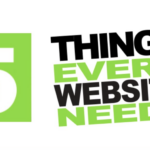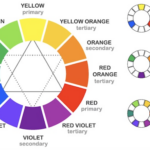5 essential things every website needs
5 Essential Elements for Every Website

Websites are crucial for modern businesses since they serve as a means of promotion, interaction, and reach. Whether you’re a startup or a multinational corporation, your website may serve as a crucial first impression. You may get the help you need in many areas of company by giving your online presence a clean, modern style.
A website may help you expand your reach even if it isn’t your primary hub. That being said, I’ve compiled a list of five necessities for every website.
1. A succinct statement of your identity
Clients and customers should be able to immediately recognise your firm as soon as they land on your website. For everyone’s sake, clarity may be achieved by just providing your name and a brief summary of your items on the homepage. Within the first two to three seconds of seeing your site, you should have the viewer’s full attention.
The top of your website is a great area to incorporate your mission statement or elevator pitch, as shown in the example given above from Instruction Partner’s curriculum support guide. To attract more customers, write a headline that highlights the most valuable service or product your business provides, and then expand on that idea in a supporting paragraph.
2. The Inquiry Form
You should never make it hard for a client to contact you. Make sure your contact information is prominently displayed so that site visitors don’t go in search of a competitor’s.
Many web designers recommend putting it in the page’s upper left or right corner. One of the best practises is to put your contact information on every page of the site. You should offer numerous contact options!
You may add a Google Maps link to your email, phone number, company hours, and/or physical location.
3. broken down into manageable amounts of information
Providing information in a straightforward and easy-to-understand manner aids comprehension for everyone. The initial impression of your site is its homepage. Make sure you don’t cram too much material in there. By dividing longer sections of text into smaller ones, using bullet points, or emphasising key terms, you may direct readers’ attention precisely where you want it.
You should also make it crystal apparent to visitors what you want them to do once they arrive on your site, whether that’s subscribing to your email list or making a purchase.
4. A mobile site that’s simple to navigate

Nowadays, a lot of people only access websites through their mobile phones or tablets.
Over 51% of all internet traffic now originates from mobile devices.
In the United States, 60% of all organic search engine hits originate from mobile devices.
As of now, mobile devices account for 53% of all online retail traffic.
Checking a link or doing a search on your phone is more convenient than bringing out your laptop while you’re in the middle of a hectic day. As a result, it is crucial that your business ensures a smooth and functional mobile site experience.
This is a common omission, but keep in mind that your clients may have a variety of preferred methods of obtaining the information they need.
5. Customer feedback
One of the most effective forms of advertising is humanising your business and its clients. Additionally, it provides the trustworthiness many visitors are seeking in a website.
There are several formats for a testimonials page, each of which is well suited to showcasing the words and experiences of happy clients.
All the wonderful things you have done for other people may be shown via video presentations, case studies, or even graphics!
This list is only the beginning of all the components that make up a good company website. With these five tips in mind, you can build a trustworthy, original, and useful website that will attract and retain clients.


















